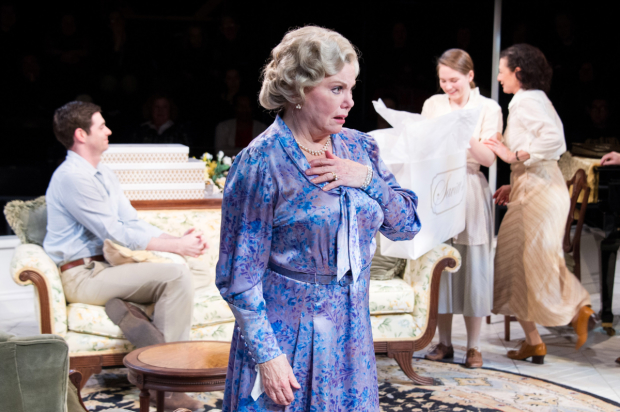Watch on the Rhine

(© C. Stanley Photography)
Lillian Hellman's voice was strong, politically determined, and aimed directly at whatever forces she felt were attacking patriotism and personal liberty. Written in 1941, Watch on the Rhine deals with the rise of fascism in Europe and the implications of its potential movement across the Atlantic Ocean.
The play takes place in 1940 in the living room of a country house, 20 miles outside of Washington, D.C. It is the home of Fanny Farrelly, an imperious woman of a certain age, who lives with her grown son, David. They gather for an early breakfast before the arrival of Fanny's daughter, Sara, whom she hasn't seen in 20 years. Fanny married Kurt Müller in Germany 17 years earlier and they have three children: Babette, Joshua, and Bodo. Now the Müller family are coming to see their American relatives.
Also in the Farrelly home are Teck De Brancovis, who says he is a Romanian count, and his wealthy wife, Marthe. It quickly becomes apparent that Teck is out of money and their bills are piling up. There are two characters who are identified as servants but who are treated as members of the family: Anise, a maid, and Joseph, a butler.
Once all the houseguests are gathered in the same room and the children are introduced to their grandmother, it slowly becomes evident that De Brancovis may not be who he says he is. He knows a great deal about Müller, for instance, and when Müller lets slip the fact that he not worked as an engineer for many years, De Brancovis picks up on that and tries to get him to reveal what work he has been doing and where he has been doing it.
Eventually, it becomes clear that De Brancovis has been spying on Müller, even going through his luggage. He demands money and threatens to tell the Nazis for whom he works that Müller is an anti-fascist. Fanny and David must decide if they will help pay off De Brancovis or foil his plans in another way.
Marsha Mason is marvelous as the expansive Fanny, who rules her house with a sometimes comic, sometimes iron hand. When the butler tells her it is only 8:30am and he doesn't ring the bell for breakfast until 9, she instructs him to move the hands on the clock to 9 o'clock and ring it. Mason plays Fanny as a nonchalant woman who has never wanted for anything in life. Yet she honestly tries to relate to her three grandchildren who have lived a fairly hard existence in Europe.
Thomas Keegan is excellent as David, Fanny's unmarried lawyer son. He is a bit sardonic, revealing that he knows that his mother is always trying to make him into a younger version of his father. Lise Bruneau is also fine as Sara, a woman sustained by the love of her family. Lucy Breedlove is charming as the teenage Babette. Ethan Miller is well cast as the sensible young man, Joshua, who must help his father rid the house of De Brancovis' evil, and Miller seems to become an adult in the process. Tyler Bowman is adorable as the youngest child, Bodo. J. Anthony Crane makes a perfect De Brancovis, with his sinister and threatening demeanor. Natalia Payne plays his wife as cool, aloof, and looking for a way out of her miserable marriage. Helen Hedman is delightful as Anise. Addison Switzer is funny as Joseph, who can't bear to keep his thoughts to himself.
Jackie Maxwell directs the play at a pace that matches the unbounded energy of the script itself. Todd Rosenthal's set uses a huge white airy gazebo to surround the living room of the wealthy Farrelly family. We immediately recognize their ilk by the vases of fresh flowers placed throughout the room and the grand piano topped with framed photographs that sits in the corner.
Costume designer Judith Bowden creates outfits that are grounded in the 1940s aesthetic, while still highlighting specific character attributes of each actor including an elegant mid-calf silk skirt and belt with a matching white silk blouse for Marthe De Brancovis, a simple blue dress for Sara, and beautifully tailored, pastel dresses for Fanny.
It might be tempting to write off any play written 76 years ago as dated and not relevant to contemporary America. But one of Hellman's main concerns in Watch on the Rhine is with the role of immigration to the United States. One of her characters strongly emphasizes how valuable Americans believe immigration to be. And the play primarily pits simple, honest people against a vicious criminal who insinuates himself into a family that values only straightforwardness and truth. It reminds us that the issues of honesty, morality, and immigration are still so very relevant today.











